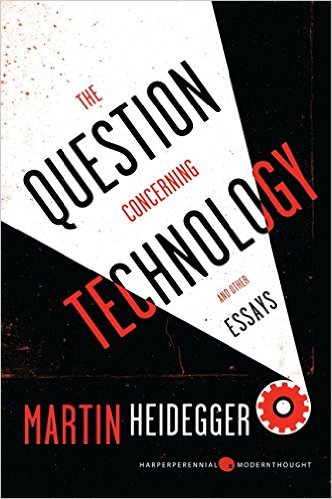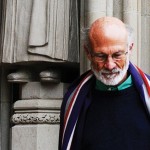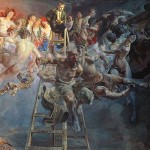Incredible as it may see, the final year of the decline of communism had more of the spirit of freedom than the period after the establishment of the new order which immediately put a stop to what many had felt strongly at that time and what despite its elusiveness is known to everybody who had an experience of freedom – a sense of having many doors open and many possibilities to pursue. Soon this sense evaporated, subdued by the new rhetoric of necessity that the liberal democratic system brought with itself. It did not take me long to make another discovery, and more depressing one, namely that this unifying tendency was not limited to the post-communist world, and did not result from its peculiarities. The adverse effects one could see throughout the western civilization. My subsequent experience of working in the European Parliament only endorsed my diagnosis.
The problem lies in the genealogy of modernity, which, taken in this Polish historical context, becomes something much more than a preoccupation for grad students:
Both communism and liberal democracy are regimes whose intent is to change reality for the better. They are – to use the current jargon – modernization projects. Both are nourished by the belief that the world cannot be tolerated as it is and that it should be changed, that the old should be replaced with the new. Both systems are strongly and – so to speak – impatiently intruding in the social fabric and both justify their intrusion with the argument that such interference leads to the improvement of the state of affairs by having them “modernised”.
 These tendencies of both communism and liberal democracy are rooted in the very intellectual foundations of modernity, rather than any deviation, rather than in something that the process can self-rectify:
These tendencies of both communism and liberal democracy are rooted in the very intellectual foundations of modernity, rather than any deviation, rather than in something that the process can self-rectify:
Modernity, a completely new era that was born when its makers decided to reject everything that preceded it and to start anew. The creators of modernity – Machiavelli, Hobbes and Bacon – saw themselves as pioneers of the new, who boldly turned their backs on the past. Towards that past, on the one hand, they felt contempt of the kind one feels towards something both foolish and harmful, and on the other hand, sympathy mixed with condescension one may feel towards something which had once, perhaps, some nobility and charm, but which disappeared never to return.
In the final analysis, which resembles Heidegger’s seminal Question Concerning Technology, the root cause of the similarity is a blind faith in modernity’s greatest blessing and biggest curse: technology. Plus it has everything to do with the accompanying denial (disbelief!) in the ultimate goodness of nature:
When we look at communism and liberal democracy from that point of view, we can see that they are both fuelled by the idea of modernization. In both systems there is a cult of technology which translates itself into acceptance of social engineering as a proper approach to reforming society, changing human behaviour and solving existing social problems. This engineering may have a different scope and dynamics in each case, but in either the society and the world at large are regarded as undergoing a continuous process of construction and reconstruction. In one system it meant reversing the current of the Siberian Rivers; in the other – a formation of alternative family models; invariably however it was the constant improvement of nature which turns out to be barely a substrate to be moulded into a desired form. Although today’s ideology of environmentalism fashioned idolatrous reverence for the earth and its fauna and flora, it did not change the enthusiasm for treating human nature and society in a dangerously technological manner.
 Legutko is not some wild Easterner in his analysis. The quintessential Westerner, Joseph Ratzinger made the same connections between communism, liberal democracy, the blind faith in progress, and the loss of the human person in the book Europe: Today and Tomorrow:
Legutko is not some wild Easterner in his analysis. The quintessential Westerner, Joseph Ratzinger made the same connections between communism, liberal democracy, the blind faith in progress, and the loss of the human person in the book Europe: Today and Tomorrow:
The communist systems collapsed primarily due to their false economic dogma. But one tends to overlook that the deeper reason for their failure was their disrespect for human beings, the subordination of morality to the needs of the system and its future promise. The real catastrophe was not of an economic nature, but the devastation of souls and the destruction of moral consciousness.
I see the essential problem of Europe and the world in the fact that the focus is entirely on economic progress. To overcome economic collapse, old communists have, without hesitation, become economic liberals. But the moral and religious problems which underlay communism’s collapse are almost entirely overlooked. To that extent, the problems left by Marxism are still present: the loss of man’s traditional understanding of God, himself and the universe.
The faces change, but modernity’s script remains the same.
====
If you want to dig even deeper into this topic, then read: 11 Most Important Critiques of Modernity According to Thomas Pfau
Those of you in Krakow shouldn’t miss my piece 7 Places You Have to Visit During World Youth Day to Get a Real Feel for the Soul of Krakow
Consider making a donation to this blog through the donation button on the upper right side of its homepage. Our family just moved to a new place, we’re experiencing car problems, and things will be financially tight until the end of this year. Your donations help keep us, and this blog, going.
Stay in touch! Like Cosmos the in Lost on Facebook:












